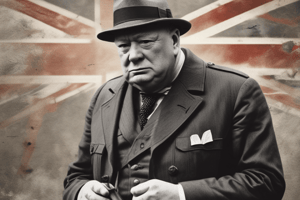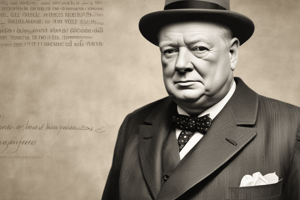Podcast
Questions and Answers
What was Winston Churchill's political party affiliation?
What was Winston Churchill's political party affiliation?
- Green Party
- Liberal Party
- Conservative Party (correct)
- Labour Party
In which wars did Churchill see action as a soldier?
In which wars did Churchill see action as a soldier?
- World War I, World War II, Korean War
- None of the above
- Vietnam War, Gulf War, Iraq War
- British India, Anglo-Sudan War, Second Boer War (correct)
What was Churchill's role in the British government during World War II?
What was Churchill's role in the British government during World War II?
- President of the Board of Trade
- Prime Minister (correct)
- Home Secretary
- Secretary of State for War
What did Churchill warn of in his 'Iron Curtain' speech?
What did Churchill warn of in his 'Iron Curtain' speech?
What was Churchill's position during the General Strike of 1926?
What was Churchill's position during the General Strike of 1926?
What was Churchill's role in the Chanak Crisis of 1922?
What was Churchill's role in the Chanak Crisis of 1922?
What was Churchill's stance on giving women the vote?
What was Churchill's stance on giving women the vote?
What was Churchill's role during the Siege of Sidney Street?
What was Churchill's role during the Siege of Sidney Street?
What was Churchill's plan to counter the growing threat of militarism in Nazi Germany in the 1930s?
What was Churchill's plan to counter the growing threat of militarism in Nazi Germany in the 1930s?
Flashcards are hidden until you start studying
Study Notes
The Life and Career of Winston Churchill
-
Winston Churchill was a British statesman, soldier, and writer who served as Prime Minister of the United Kingdom twice, from 1940 to 1945 during the Second World War, and again from 1951 to 1955.
-
Churchill was a member of the Conservative Party, which he led from 1940 to 1955, but also a member of the Liberal Party from 1904 to 1924.
-
He was born to a wealthy, aristocratic family in Oxfordshire and had a mixed English and American parentage.
-
Churchill joined the British Army in 1895 and saw action in British India, the Anglo-Sudan War, and the Second Boer War, gaining fame as a war correspondent and writing books about his campaigns.
-
Churchill served in various government positions, including President of the Board of Trade, Home Secretary, First Lord of the Admiralty, Minister of Munitions, Secretary of State for War, Secretary of State for Air, and Secretary of State for the Colonies.
-
Churchill was a key figure in calling for British rearmament to counter the growing threat of militarism in Nazi Germany in the 1930s.
-
Churchill became Prime Minister in May 1940 and formed a national government to oversee British involvement in the Allied war effort against the Axis powers, resulting in victory in 1945.
-
After the Conservatives' defeat in the 1945 general election, he became Leader of the Opposition and promoted European unity and warned of an "iron curtain" of Soviet influence in Europe.
-
Churchill was awarded the Nobel Prize for Literature in 1953 and lost the 1950 election, but was returned to office in 1951.
-
His second term was preoccupied with foreign affairs, especially Anglo-American relations and preservation of what remained of the British Empire.
-
Churchill resigned as Prime Minister in 1955 and died in 1965, where he was given a state funeral.
-
Churchill remains popular in the Anglosphere, where he is seen as a victorious wartime leader who played an important role in defending Europe's liberal democracy against the spread of fascism. He has been criticised for some wartime events and also for his imperialist views.Winston Churchill's Political Career: 1905-1916
-
Churchill gained a reputation as a radical under the influence of John Morley and David Lloyd George and won the Manchester North West seat in the 1906 general election.
-
He became Under-Secretary of State for the Colonial Office and oversaw the formation of a government in the Orange River Colony.
-
Churchill helped draft a constitution for the Transvaal, sought to ensure equality between the British and the Boers, and announced a gradual phasing out of the use of Chinese indentured labourers in South Africa.
-
Churchill became President of the Board of Trade and lost the Manchester North West by-election but won the safe seat of Dundee.
-
He proposed marriage to Clementine Hozier and they were married in 1908. The success of his marriage was important to Churchill's career as Clementine's unbroken affection provided him with a secure and happy background.
-
Churchill established a reputation as a conciliator and worked with Lloyd George to champion social reform.
-
He introduced the Mines Eight Hours Bill, the Trade Boards Bill which established the principle of a minimum wage, and the Labour Exchanges Bill.
-
Churchill became Home Secretary in 1910 and implemented a prison reform programme. He supported giving women the vote but would only back a bill to that effect if it had majority support from the (male) electorate.
-
Churchill dealt with the Tonypandy Riot, in which coal miners in the Rhondda Valley violently protested against their working conditions, and the Siege of Sidney Street.
-
Churchill became First Lord of the Admiralty and focused on naval preparation, visiting naval stations and dockyards, and scrutinising German naval developments. He was interested in the Middle Eastern theatre and wanted to relieve Turkish pressure on the Russians in the Caucasus by staging attacks against Turkey in the Dardanelles.
-
Churchill was held by many MPs, particularly Conservatives, to be personally responsible for the failure of the campaigns in the Dardanelles and Gallipoli and was removed from the Admiralty.
-
Churchill joined the Army and was attached to the 2nd Grenadier Guards, on the Western Front, and was temporarily promoted to lieutenant-colonel and given command of the 6th Royal Scots Fusiliers. He narrowly escaped death and returned to the rank of major.Summary Title: Winston Churchill's Political Career from 1916 to 1939
-
Lloyd George succeeded Asquith as Prime Minister in 1916 and appointed Churchill as Minister of Munitions in 1917.
-
Churchill negotiated an end to strikes in munitions factories and increased production. He also penned the plan for the next year's attack that would bring final victory to the Allies.
-
Churchill was appointed Secretary of State for War and Air in 1919 and was responsible for demobilising the British Army. He was an outspoken opponent of Lenin's Communist Party government in Russia.
-
Churchill became Secretary of State for the Colonies in 1921 and was involved in negotiations with Sinn Féin leaders and helped draft the Anglo-Irish Treaty.
-
Churchill became involved in the Chanak Crisis in 1922, which resulted in the Conservative withdrawal from the government, precipitating the November 1922 general election.
-
Churchill spent much of the next six months at the Villa Rêve d'Or near Cannes, where he devoted himself to painting and writing his memoirs.
-
Churchill stood as an independent anti-socialist candidate in the Westminster Abbey by-election in 1924 but was defeated.
-
Churchill became Chancellor of the Exchequer in 1924 and presented five budgets in all to April 1929.
-
During the General Strike of 1926, Churchill edited the British Gazette, the government's anti-strike propaganda newspaper.
-
After Hitler came to power, Churchill warned the British government of the menace of such a regime and expressed alarm that the British government had reduced air force spending.
-
Churchill called for a mutual defence pact among European states threatened by German expansionism in 1938.
-
In September 1938, Chamberlain signed up to the Munich Agreement, agreeing to allow German annexation of the Sudetenland. Churchill called the agreement "a total and unmitigated defeat".Winston Churchill's Leadership during World War II
-
Churchill was reappointed as First Lord of the Admiralty on the day Britain declared war on Germany, and his popularity increased after the dismemberment of Czechoslovakia in 1939.
-
As First Lord, Churchill was one of the highest-profile ministers during the "Phoney War", and his speeches and actions considerably enhanced his reputation.
-
Churchill was concerned about German naval activity in the Baltic Sea and initially wanted to send a naval force there, but this was soon changed to a plan to mine Norwegian waters and stop iron ore shipments from Narvik to Germany.
-
Following the Allies' failure to prevent the German occupation of Norway, the Commons held an open debate known as the Norway Debate, and Churchill was called upon to defend the government without damaging his own prestige.
-
Churchill succeeded Chamberlain as Prime Minister in May 1940 and formed a five-man war cabinet, which changed in size and membership as the war progressed.
-
Churchill's resolve to fight on, even if France capitulated, remained precarious until Chamberlain resolved to support him.
-
Churchill's use of rhetoric hardened public opinion against a peaceful resolution and prepared the British people for a long war.
-
Churchill succeeded as an orator despite being handicapped from childhood with a speech impediment.
-
Operation Dynamo, the evacuation of Allied servicemen from Dunkirk, ended with over 338,000 servicemen being rescued.
-
Churchill was confident that Great Britain could hold its own during the Blitz, but was realistic about its chances of winning the war without American intervention.
-
Churchill's good relations with United States President Franklin D. Roosevelt helped secure vital food, oil, and munitions via the North Atlantic shipping routes.
-
Churchill addressed a joint meeting of the US Congress on 26 December 1941 but suffered a mild heart attack that night, diagnosed as a coronary deficiency needing several weeks' bed rest.
Studying That Suits You
Use AI to generate personalized quizzes and flashcards to suit your learning preferences.




